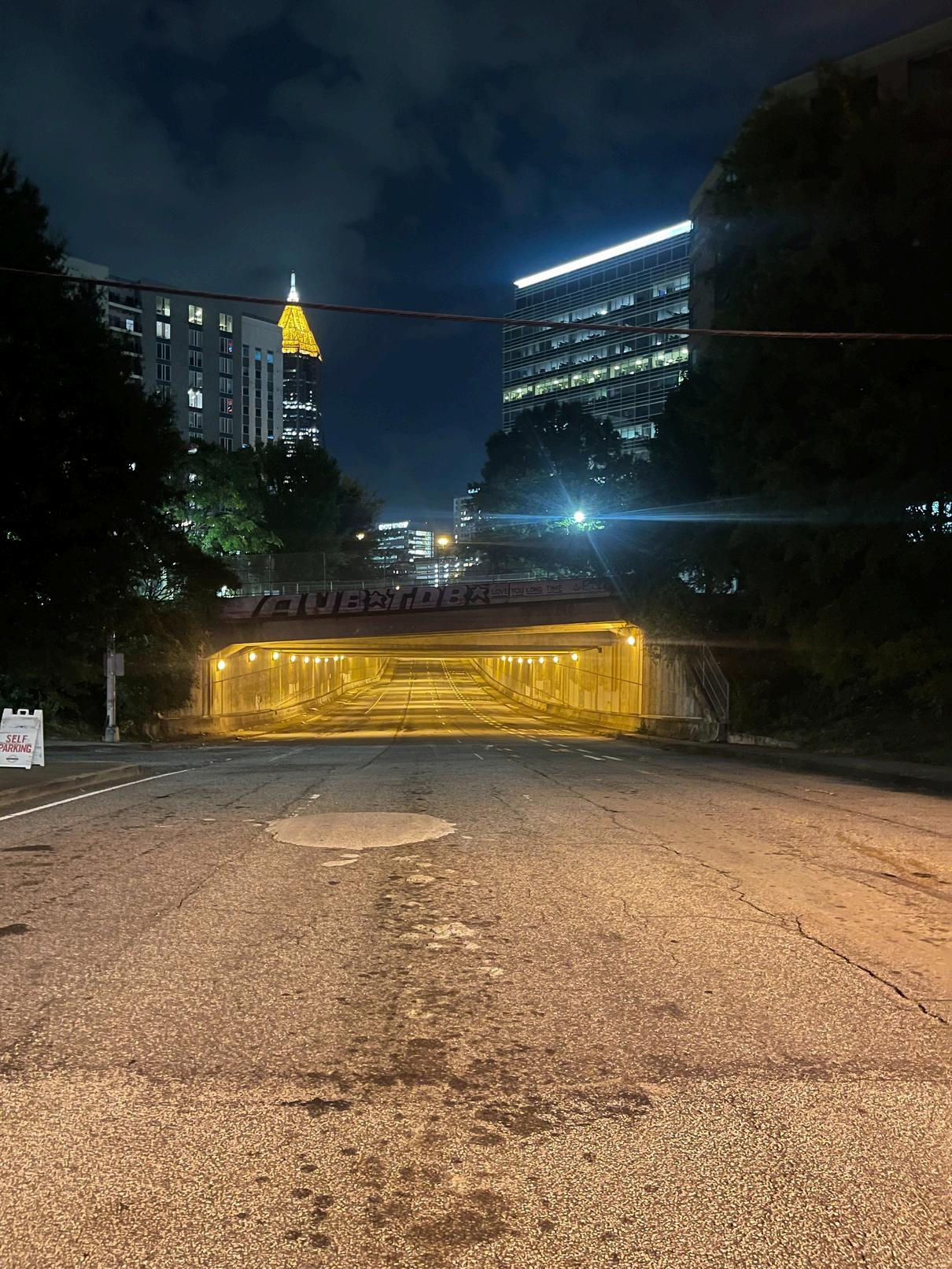“I wouldn’t change anything.”
-Nicolas Closson Age: 42
In the heart of Atlanta, where gleaming skyscrapers cast long shadows, a different reality unfolds on the streets below. The city's homeless population, estimated at over 3,000 according to the 2022 Point-inTime Count, faces daily challenges that often go unnoticed by passersby. One of these individuals, Nicolas (name changed for privacy), shared his story with us, offering a glimpse into the complex issue of homelessness in Georgia's capital.
Nicolas, a 42-year-old father of three, has been homeless for five years, with the last two and a half spent in Atlanta. "I'm from Maine," he explains, his voice tinged with a hint of his New England roots. "I was coming down to Louisiana to see my family when I missed my bus. I didn't have the money for another ticket, and I just got stuck here." His chuckle belies the gravity of how a single missed connection changed the course of his life.
Life on Atlanta's streets is a constant struggle for stability. "The streets are okay," Nicolas says, "but they keep making us leave our camp sites. They let us set up tents, but give it a week or two, maybe a month, and they force us out. I don't know where they expect us all to go."
This cycle of displacement is a common issue faced by Atlanta's homeless population. According to the Metro Atlanta Task Force for the Homeless, the city's policies on encampments have been criticized for displacing individuals without providing adequate alternatives.
When asked about the challenges of homelessness in Atlanta, Nicolas tone grows serious. "Winter is the toughest. Last year, thirteen people died under the bridge from freezing to death." This grim statistic aligns with reports from local homeless advocacy groups, which have long called for more winter shelters and resources.
Nicolas argues that the city's approach to homelessness needs a major overhaul. "Take that $30 million grant they got from the federal government and put it towards the homeless," he suggests. "Instead of building high-rise apartments that sit empty, revamp them into shelters or housing for the needy." is suggestion isn't far-fetched. Cities like Los Angeles and New York have implemented similar programs, converting unused buildings into transitional housing with some success. Despite his circumstances, Nicolas maintains a philosophical outlook on his journey. "If I could go back in time, I wouldn't change anything," he reflects. "You're exactly where you're supposed to be. Everything happens for a reason."
When asked what advice he'd give to youth today, Nicolas response is immediate: "Stay off drugs and finish school." His words echo the sentiments of many outreach programs in Atlanta that focus on education and substance abuse prevention as key strategies in combating homelessness.
CONCRETE Pillows
In the shadow of Atlanta's gleaming skyline, thousands of individuals navigate life without a permanent address. Among them is John, whose story illuminates the complex challenges faced by the city's homeless population.
"It all goes to show I was just down on my luck," John begins, his eyes reflecting a mix of weariness and determination. "I'm not the only one. You've got about 5,000 homeless people out here." John's journey into homelessness began with a cruel twist of fate. "Someone stole my luggage, ripped up my ID, birth certificate, social security card – all of it," he recounts. This loss of crucial documentation has been a significant hurdle in his efforts to secure housing and employment.
Despite these setbacks, John maintains a remarkably positive outlook. When asked what advice he'd give to his younger self, he responds thoughtfully, "Don't give up. Everybody has their own struggle, whether it's physical or spiritual. With God, you can overcome anything. Just keep hope alive."
Atlanta’s Homeless Landscape
Atlanta's homeless population faces numerous challenges, particularly during the harsh winter months. However, John, who has experienced homelessness in other major cities, offers a unique perspective. "I've been to Miami, Chicago... other cities are a lot worse than Atlanta," he observes. "Atlanta is a place with a lot of opportunity." Yet, opportunities alone aren't always enough. Michael acknowledges the personal struggles many face on the streets. "Everyone has their own problems – alcohol, cigarettes, drugs, whatever keeps you down. It's time to give all that up and go forward."
Food and economic challanges
When discussing Atlanta's food deserts and the broader issue of food insecurity, John sees room for improvement. "The economy is picking up a little bit," he notes. "If they had enough people to work and keep everything going, the problem would be a lot better."
This observation aligns with recent studies indicating a correlation between unemployment rates and food insecurity in urban areas.
Solutions and Personal Responsibility
Regarding potential solutions to homelessness in Atlanta, John emphasizes the importance of personal initiative alongside community support. "It's alright to help people, but you also have to want to help yourself," he asserts. "A lot of people, they love the street life. That's all they know."
"As soon as I get me a place, I'm gone."
As Atlanta continues to grapple with its homeless population, stories like John's underscore the need for comprehensive solutions that address not only immediate needs but also long-term challenges such as document recovery, job opportunities, and addiction support. They also remind us of the resilience and hope that persists even in the most challenging circumstances.
While we sleep tightly this is them nightly.
John Heard- “Physical or spiritual a struggle is a struggle ”





